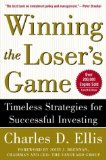The Loser’s GameI selected this book because I was intrigued as to why Ellis described investing in the stock market the loser’s game. In reality, the loser’s game is not investing in the stock market, but trying to beat the stock market. Ellis contends that trying to beat the stock market has evolved from a winner’s game to a loser’s game. The reason for the evolution is due to the number of professionals associated with the stock market. Investing institutions currently make up 90% of total public transactions. For this reason, in order to beat the market, investors must find and exploit other professional investor’s mistakes. Attempts to beat the market usually leads to active investing, where returns are eroded by trading costs and taxes on top of the already powerful eroding force that is inflation. Winning the Loser’s GameEllis’ solution to the loser’s game is to just not play. If you don’t play you can’t lose. He does not suggest stuffing your money under the mattress for preservation. Ellis believes in applying a long-term investment policy to take advantage of compound interest. He advocates developing a long-term investment policy that is based on selecting an appropriate level of risk. The appropriate level of risk is determined by the highest ratio of equities that you handle during a bear market. Responsibility of an Investment ClientA large portion of the book is spent breaking down the investment client and investment manager relationship. Ellis claims that the client must play the most important role in this relationship. Most individuals think they are paying an investment manager to make all of the decisions. This is not the case. The client should be responsible for defining an investment policy (optimally a long-term policy), after which the manager must adhere to this policy. History of the Stock MarketKnowing the history of the stock market goes a long way in developing a long-term investment policy to win the loser’s game and establish a successful relationship with your investment manager. An understanding of the turbulent nature of stocks in the short-term goes a long way towards developing an appropriate ratio of equities, while also tempering your expectations from an investment manager. Ellis argues that you should select an investment manager based on your willingness to double up with him when he is losing to the market based on the reversion to the mean theory. Conclusion“Winning The Loser’s Game” can be slightly more difficult of a read than I was hoping. A few times I had to re-read sections to truly understand his argument. Otherwise, it was a very interesting read that put a different twist on the stock market. I had never thought of the stock market as being run by professionals with limitless information. I would recommend this book, but it does not even come close to matching “A Random Walk Down Wall Street”. |
Book Review: Winning The Loser’s Game
Posted in Reviews.
– January 15, 2009











0 Responses
Stay in touch with the conversation, subscribe to the RSS feed for comments on this post.